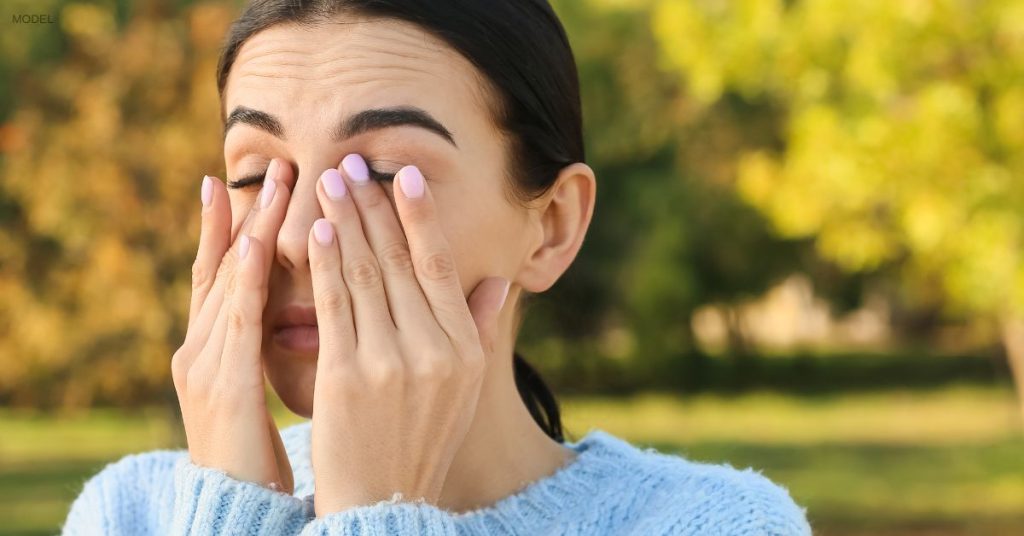Have you ever had that weird and uncomfortable twitching feeling in your eye? Many of our patients ask if their allergies or stress cause eye twitching, but the truth is this can be triggered by a number of things. Fortunately, most of these causes are typically not related to common eye concerns or medical problems, as we’ll discuss later in this post.
When To Seek Help For Eye Twitching?
Eye twitching can range from minor, occasional spasms to more persistent, involuntary movements. The most common form, known as myokymia, feels like a subtle rippling of muscle contractions in the eyelid. However, more serious forms of eye twitching exist, such as blepharospasm, a neurological condition characterized by forcible closure of the eyelids, and hemifacial spasms, an involuntary twitching of the facial muscles on one side of the face. While these conditions are rare, they should be evaluated and treated by an eye doctor.
5 Common Causes of Eye Twitching
Everyday eye twitching is often triggered by simple factors—many of which have easy solutions. Identifying the causes can help you manage and reduce those annoying spasms.
1. Stress and Eye Strain
Whether it is from work, family, or friends, we all experience stress at some point. Learning to manage stress is not only good for your eyes but also benefits your mental health.
Eye twitching is often related to vision strain, which can be reduced by limiting time spent in front of the many screens we use daily. Check out one of our past blogs about vision strain to learn about ways to reduce eye strain.
2. Tiredness
Lack of sleep can cause the eyelid to spasm. The recommended amount of sleep for adults is 7 to 8 hours per night. For some people, getting that much sleep just isn’t feasible, while others require more sleep. Establishing a set sleep and wake schedule helps your body sync into a routine. Exercising regularly and avoiding eating 2 to 3 hours before going to sleep also helps. If all else fails, try counting sheep. Just prioritize your rest; your eyes will thank you.
3. Caffeine
We start our day with it, then follow with the requisite mid-morning pick-me-up. By the time afternoon rolls around, it’s time for another beverage of caffeinated delight. Coffee, soda pop, and tea all contain caffeine (unless you are drinking the decaf variety) and can increase eyelid spasms and twitching. If you think your caffeine intake may be to blame, try to cut back to help prevent annoying twitches.
4. Dry Eyes
Dry eyes do more than make your eyes itchy; they can also make them twitchy. Dry eyes are very common among older patients, as well as people who wear contact lenses or take certain medications. They also result from extended computer and screen time. Using eye drops to keep your eyes moist usually helps quell twitching. Read our related blog post for more tips to combat dry eyes.
5. Allergies
We all dread certain times of the year when allergies strike hard, causing incessant sneezing and itchy, watery eyes. When your eyes itch, the natural reaction is to rub them, which releases histamine into the lid tissue. This histamine then causes—you guessed it—eyelid twitching.
To offset the discomfort of twitching eyelids and allergy symptoms, we recommend over-the-counter antihistamines.
What To Do For Persistent Eye Twitching
As you can see, most causes of eye twitches are easily fixed with simple changes to your daily routine. For those really stubborn twitches, though, don’t flinch at the thought of seeing an eye doctor in OKC for medical attention; involuntary eye spasms could be the cause of a more serious problem, and we’re here to help.
Contact nJoy Vision in Oklahoma City at (405) 842-6060 or request a consultation today.
This blog post was originally published in August 2014 and updated in March 2025.

